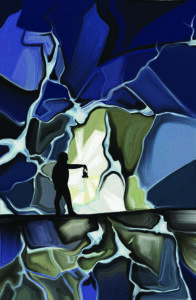By Ilima Loomis

For years, people thought of dopamine as the “reward molecule,” fueling cravings for drugs and other substances by giving users a hit of pleasure. But recent studies by Vanderbilt Center for Addiction Research investigators, such as Erin Calipari, assistant professor of pharmacology and VCAR director, have challenged that assumption. “What my work has shown is that it’s not really a reward signal,” she said. “It responds to anything important in the environment, and it helps us learn. If you put your hand on a hot stove, that would also increase dopamine.”
The finding has major implications for drug addiction and treatment because it shows how dopamine triggered by drug use helps people learn drug-taking behaviors that become deeply ingrained. Conversely, when people stop taking drugs and dopamine drops, learning to change those behaviors becomes much, much harder. It’s the kind of research that Danny Winder, now chair of the Department of Neurobiology at UMass Chan Medical School, hoped to see when he launched VCAR in 2016. Vanderbilt was already known for its addiction research, he said, and the combination of the surging opioid crisis—which increased public interest in addiction research—and a renaissance in technologies for studying and manipulating the brain made the timing uniquely right. Winder hoped that the center would foster greater collaboration among Vanderbilt researchers, while also attracting new stars—one of the first of which was Calipari.

One approach that sets the center apart is its innovative use of technology, he said. While recent years have seen an explosion of new capabilities for studying the brain in minute detail, those technologies have mainly been applied to studying conditions like Alzheimer’s disease, Parkinson’s, and other neurodegenerative diseases, he said—not addiction.
“We’re known for implementing cutting-edge technology with substance use disorder questions, which is pretty unique,” said Winder, who was the founding director of VCAR.
Another strength of the center is the opportunity it creates for collaborations, he said, especially between animal and human researchers. This allows scientists to take discoveries they make in the lab and fast-track them toward applications that can be used in human medicine. “There’s always the challenge in preclinical research: You’re climbing up a mountain, but is it the right mountain?” he said. “We have awesome opportunities at Vanderbilt not only to climb the right mountain, but to work with entities like the Warren Center for Neuroscience Drug Discovery to move something forward into actual clinical trials without ever having to leave campus to do that.”
In 2023, VCAR joined the cadre of research centers funded by the Discovery Vanderbilt portfolio, an initiative of the Office of the Provost and one of three pathways in the university’s Dare to Grow campaign, established to support and extend the resources underpinning Vanderbilt’s most innovative research and education.
One area of exciting new research in the center has focused on understanding how abstinence impacts the brain. Researchers already knew that it is common for people in recovery to develop symptoms of anxiety and depression after they stop using substances—and this distress often contributes to relapse.
In a mouse study, Vanderbilt researchers took a closer look at the circuits of the brain involved in anxiety and depression and what happened when animals that had previously been given alcohol had the alcohol removed. “They found that if we intervene in the first few days of abstinence, we can prevent the development of anxiety- and depression-like symptoms,” Winder said. “It shows that this might be a particularly important treatment window during the recovery process.”
Destigmatizing substance use disorder

In addition to the science, both Winder and Calipari say that destigmatizing substance use disorder motivates their work. Calipari noted that while diseases such as cancer and COVID-19 easily attract resources and public support for study and treatment, addiction medicine has often been left behind. “With COVID-19, the world recognized so quickly that we needed to solve the problem,” Calipari said. “And the number of deaths it took to get there was a fraction of the addiction deaths each year—it wasn’t even close.”
From nicotine-linked cancers to alcohol-related deaths and the current overdose crisis, addiction is a leading cause of death in the U.S. and results in an enormous public cost. And yet, treating substance use disorder as a moral failing rather than a medical problem has led to the issue being understudied, resulting in a lag in science-based solutions.
“The problem of addiction leads to a huge public health problem that we walk through on a daily basis, and we don’t really think about it,” Winder said. “We need people to understand that basic science can impact a disease like addiction, just like it can cancer and COVID-19.”